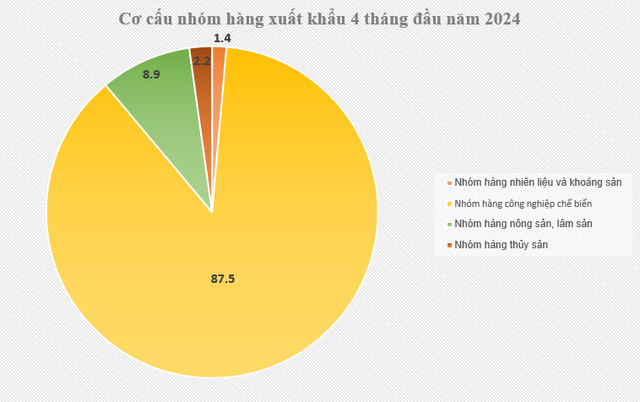At the conference “Protecting Intellectual Property Rights of Vietnam – Japan” on February 28, Deputy Ambassador of the Japanese Embassy in Vietnam Shige Watanabe assessed that the prevalence of counterfeit and fake goods in Vietnam has a negative impact on the process of forming a healthy market.
JAPANESE GOODS ARE POPULAR AND THUS ARE COUNTERFEITED MORE
Through the conference, the Deputy Ambassador hopes that the capacity to handle infringements of Japanese intellectual property rights in Vietnam will be enhanced. Thereby, it will support 200 businesses as well as over 90 Japanese organizations operating in the Vietnamese market.
According to statistics, during the period of 2021 – 2023, market management forces have conducted inspections and handled thousands of cases related to the infringement of Japanese intellectual property rights in Vietnam.
Specifically, the cosmetics sector has had 123 cases processed, with fines of over 959 million VND; the functional food sector has had 31 cases, with fines of 226 million VND; 100 cases related to food hygiene and safety have been fined a total of 707 million VND.

For Japanese electrical appliances, a product category that is popular in the Vietnamese market, market management forces have discovered and handled 95 cases, with fines of over 1.6 billion VND; the fashion industry has had 93 cases processed, with fines of over 1.3 billion VND; and the highest number of cases is related to motorcycle spare parts, with 611 cases processed and fines of over 4.2 billion VND.
Although positive results have been achieved, Mr. Nguyen Thanh Binh, Deputy General of the General Department of Market Management (Ministry of Industry and Trade), believes that the results have not been truly sustainable, and the situation of counterfeit goods, goods with unclear origins, and goods that infringe intellectual property rights is becoming increasingly complex.
There are many objective and subjective reasons for this, such as increasingly complex and sophisticated methods of producing and trading counterfeit goods; overlapping and inconsistent enforcement mechanisms; limited resources; low awareness of organizations and individuals; and lack of coordination between businesses and law enforcement agencies.
In addition, the inspection and handling of violations encounter difficulties in recognizing genuine goods, counterfeit goods, and protected goods.
There are also new forms of fraud by production and business entities, new business methods, and coordination between rights holders and inspection agencies…
In addition, Mr. Nguyen Nhu Quynh, Chief Inspector of the Ministry of Science and Technology, believes that there are still many difficulties, partly due to continuous variations in violations and limitations of the capacity of enforcement officers.
“Therefore, the logic is to improve policies and laws, strengthen training to enhance the capacity of personnel, and raise consumer awareness,” emphasized Chief Inspector Nguyen Nhu Quynh. Because if there is still tolerance of counterfeit products by consumers, all efforts from a management perspective will not be effective.
NEED FOR COOPERATION BETWEEN BOTH SIDES
Providing solutions to contribute to improving the effectiveness of the fight against counterfeiting and the protection of intellectual property rights for Japanese products, Mr. Nguyen Duc Le, Deputy Director of the Department of Business Operations, General Department of Market Management, said that the General Department has issued and focused on implementing Decision No. 888/QD-TCQLTT on the Plan to combat counterfeiting, goods with unclear origins, and infringement of intellectual property rights from 2021 to 2025…

The goal is to eliminate the situation of counterfeit goods, goods that infringe intellectual property rights, and goods with unclear origins being publicly displayed nationwide. There will be no more public production, trade, counterfeit goods, and goods that infringe intellectual property rights in craft villages across the country.
The owners of e-commerce platforms and social media commit not to allow the public sale of counterfeit goods, goods that infringe intellectual property rights, and goods with unclear origins on their platforms.
At the same time, aiming to improve the system of policies and laws on inspection, handling administrative violations, standards, measurement, quality of products, goods, and brands in e-commerce activities… 100% of major e-commerce platforms sign commitments not to sell counterfeit goods.
Deputy Director Nguyen Duc Le advised that Japanese businesses with products sold in the Vietnamese market need to enhance coordination, provide information, and appoint legal representatives to support the inspection and handling of violations by the General Department of Market Management.
In 2024, the General Department and the Japan Patent Office (JPO) need to coordinate and organize a workshop to connect rights holders and representatives of Japanese brands in Vietnam to establish better collaboration in the future.
In addition, both sides actively enhance cooperation by organizing workshops, exchanges, and sharing experiences between JPO and relevant Japanese agencies in the fight against counterfeit goods and goods that infringe intellectual property rights.
Sharing experiences, cooperation, and support for specialized training courses and training in counterfeiting and infringement of intellectual property rights, as well as the management and supervision of e-commerce activities.





































